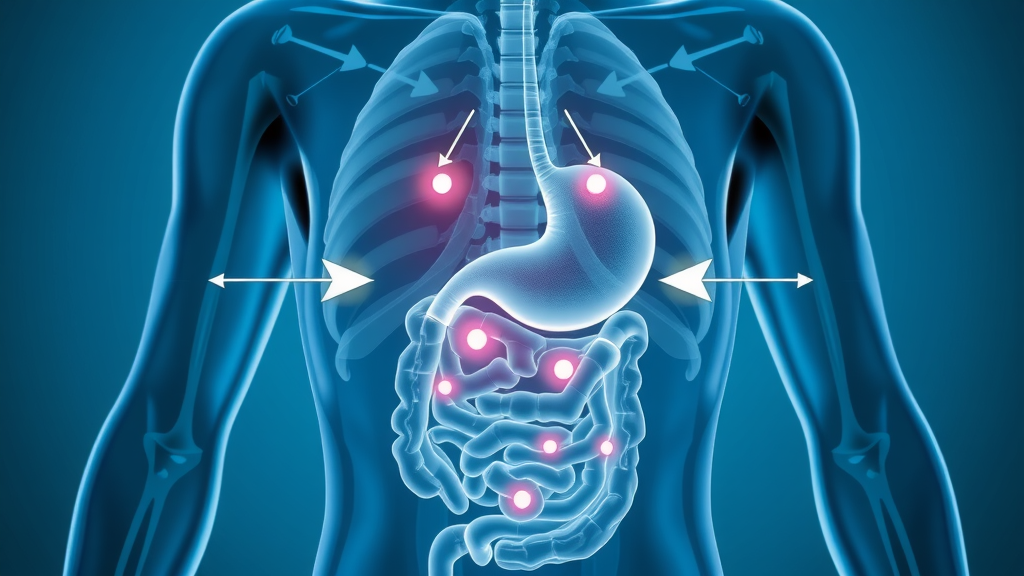Did you know over 40% of American women struggle with obesity, and many find that traditional diets just don’t work? Yet, a new wave is rising—GLP-1 drugs combined with mindful eating could transform the way we approach weight loss, especially for those who've tried everything else. In this guide, discover how pairing medication and food awareness offers real hope for lasting change.
A Surprising Shift: GLP-1 Drugs and Mindful Eating in the Modern Weight Loss Journey
In a world where the search for effective weight loss never stops, many women are turning to GLP-1 drugs and mindful eating as a powerful tandem. For those frustrated by countless fad diets and fleeting results, this innovative approach is gaining momentum. GLP-1 receptor agonists like semaglutide (Ozempic, Wegovy) and liraglutide are now proven to result in medically significant weight loss in clinical trials. But here’s the twist: experts are finding that combining these drugs with mindful eating could be the real breakthrough for women who’ve always found weight management elusive.
Why? GLP-1 drugs suppress hunger signals and lower blood sugar, yet their full benefit is unlocked when paired with behavior change—like learning to read true hunger cues and fight back against emotional eating. While medications target the body’s biology, mindful eating retrains your brain and relationship with food. This blend is not about restriction, but empowerment. In the following sections, we’ll break down how these two strategies work hand in hand, the potential side effects, and actionable steps for success—especially for women starting this journey feeling skeptical or defeated.
What You’ll Learn About GLP-1 Drugs and Mindful Eating
The science behind GLP-1 drugs and their impact on weight loss
How mindful eating can complement GLP-1 therapies
Potential side effects and practical eating strategies
Real-life advice tailored for women seeking sustainable results

Understanding GLP-1 Drugs and Mindful Eating: Foundations of Modern Weight Loss
What Are GLP-1 Drugs and How Do They Influence Eating Behavior?
GLP-1 (Glucagon-like peptide-1) drugs, such as Wegovy and Ozempic, are receptor agonists originally approved for managing type 2 diabetes—and now prescribed for weight loss. They mimic the action of a natural hormone that helps moderate appetite, regulate blood sugar, and slow gastric emptying. In plain terms, they make you feel fuller, faster and reduce “food noise,” the constant craving for snacks or emotional eating triggers women often face.
But how do they actually work? GLP-1 receptor agonists target pathways in the brain and digestive system, dampening hunger signals. This is crucial for women who struggle with eating habits that seem immune to willpower alone. Studies show that those who use these drugs experience not just a decrease in body weight, but also in obsessive food thoughts—a true relief for many. The challenge? Without learning to tune into new hunger cues and mindful eating practices, some women may wrestle with unwanted side effects or rebound weight gain after stopping the medication.
The Science: Receptor Agonist Action and Appetite Regulation
At the core of GLP-1’s effect is its action as a receptor agonist. When you eat, your body releases GLP-1, which sends signals to the brain that reduce appetite and promote satiety. The drugs enhance these signals, resulting in diminished cravings and improved portion control. As confirmed by clinical trials, people with obesity taking GLP-1 drugs like semaglutide saw significant weight loss compared to those relying on lifestyle changes alone.
However, appetite control is only one piece of long-term weight management. Habitual eating behaviors—like stress snacking or ignoring natural hunger—can undercut the drugs’ effects. That’s where mindful eating enters, helping women slow down, recognize real hunger, and eat for nourishment rather than emotion. By leveraging both biology and psychology, you create a holistic approach to weight loss that goes far beyond a quick fix.
"GLP-1 receptor agonists may transform the way patients approach weight loss, but success often hinges on changing eating habits and behaviors."

GLP-1 Drugs and Mindful Eating: Can They Work Together for Weight Loss?
Integrating GLP-1 Drugs with Mindful Eating and Intuitive Eating Practices
So how do you make GLP-1 drugs and mindful eating work together? The answer lies in synergy. Medications can reduce cravings and dampen urge-driven eating, but women see the best, most sustainable results when these benefits are paired with mindful and intuitive eating practices. Intuitive eating doesn’t mean throwing away all dietary structure. Instead, it’s about learning to interpret your body’s hunger cues accurately—notice when you’re hungry, full, or emotionally triggered—and responding in kind.
This approach shifts weight management from sheer discipline to an act of self-respect, helping to heal your relationship with food. People find they experience food with less guilt and more clarity. Plus, these mindful habits remain even if they stop the medication, breaking the cycle of diet failure. Whether you’re new to GLP-1 or a veteran of countless diets, integrating mindfulness offers a new, compassionate path to health.
Balancing Hunger Cues and Eating Patterns
Learning to recognize and honor hunger cues is a cornerstone of both mindful and intuitive eating—especially when GLP-1 drugs change how you feel hunger. It’s common for women taking these medications to lose their appetite or not feel true hunger as often. The risk? Ignoring the body’s needs entirely or over-restricting, leading to fatigue, mood swings, or eventual rebound eating. Balancing these new signals with conscious eating patterns is essential.
This is where a registered dietitian or health coach can be invaluable, offering personalized steps that combine your GLP-1 regimen with eating behavior adjustments. Tracking your meals, noting changes in fullness and emotional states, and adjusting food quality (adding more fiber, protein, or healthy fats) helps ensure you stay nourished. Gradual adjustments allow your body—and mind—to adapt, creating a positive relationship with food and a foundation for lasting weight loss success.
Aspect |
GLP-1 Drugs |
Mindful Eating |
|---|---|---|
Effect on Appetite |
Suppresses hunger signals |
Heightens awareness of hunger cues |
Weight Loss Outcome |
Medically significant reductions |
Behavioral and gradual |
Eating Habits Impacted |
Portion control by biology |
Conscious food choices |
Potential Side Effects |
Nausea, GI issues |
None |
Long-Term Sustainability |
Depends on continued use |
Dependent on ongoing behavior change |

GLP-1 Drugs and Mindful Eating: Weight Loss Results and Real Stories
A Beginner-Friendly Approach to Healthy Eating Habits
If you’re just starting on GLP-1 drugs and mindful eating, simplicity and self-compassion are key. Women frustrated with “failing” at previous diets often find the road easier once hunger is genuinely blunted by medications. Here’s where you can focus on small, sustainable behavior changes—like listening to your hunger cues, keeping meals balanced, and being gentle with yourself when you don’t eat perfectly. Ignoring guilt and tuning into your body’s signals is more valuable than striving for perfection.
Begin by slowing down at meals, chewing thoughtfully, and noticing the flavors, textures, and how food makes you feel. This creates a positive feed-forward loop: you eat less without feeling deprived, savor more without stress, and gradually build confidence around your food choices. Over time, these patterns become more automatic, supporting steady weight loss and a calmer mindset in the kitchen.
Women’s Experiences: Navigating Relationship with Food
Millions of women have felt trapped by old eating patterns—binging under stress, constant snacking, or shaming themselves for every slip. GLP-1 drugs can silence the noisy cravings that make you feel out of control. But true breakthroughs often come when mindful eating dissolves years of dieting guilt and fosters a fresh, empathetic relationship with food. Women report learning to enjoy meals again, free from relentless worry about calories or scales. Many describe feeling “present” during meals for the first time in years.
These real-world accounts send a clear message: the magic isn’t just in the medication—it’s in reclaiming joy and autonomy over eating. When women can nurture their bodies without judgement, releases the hold that food—and the scale—has had over their lives.
"I finally feel like I’m in control of my cravings—GLP-1 drugs and mindful eating gave me a fighting chance where diets always failed." – Real Patient Story

List of Tips: Practicing Mindful Eating While on GLP-1 Drugs
Listen to your body’s hunger cues regularly: Notice true signals of hunger and fullness, keeping a journal if needed to connect eating behaviors with emotions and side effects.
Eat slowly and savor each bite: Give your body time to register feelings of satiety, which can be different on GLP-1 drugs than with intuitive eating alone.
Document your feelings and eating behaviors: Track how your cravings, emotions, and food noise change day by day with medication and mindfulness.
Choose nutrient-dense foods to support your health: Focus on lean proteins, whole grains, vibrant fruits and vegetables that help stabilize blood sugar and maximize energy.
Reflect on your relationship with food post-GLP-1 initiation: Notice positive changes and reinforce healthy self-talk. Celebrate progress, not perfection.
Navigating GLP-1 Drugs and Mindful Eating: Potential Side Effects and Safe Practices
Common Side Effects and How to Manage Them
Just as no two weight loss journeys are the same, not all women will experience GLP-1 drug side effects the same way. The most common concerns reported in clinical trials include nausea, bloating, constipation or diarrhea, and headaches. Sometimes, women on higher doses—especially those new to GLP-1 receptor agonists—find these symptoms most noticeable at the outset. Here’s the good news: for many, these symptoms fade with time, and pairing with mindful eating strategies often helps. Eating slowly, choosing gentle-on-the-stomach foods, and paying close attention to your hunger cues (never forcing food) are practical steps almost everyone can take.
Still, some potential side effects require a conversation with your healthcare provider. Persistent vomiting, severe abdominal pain, or signs of allergic reaction should never be ignored. Don’t tough it out alone: medical guidance ensures your weight loss remains safe as well as effective. As always ask about food choices, supplements, or meal timing that can further ease your transition on GLP-1 drugs.
When to Seek Medical Advice About GLP-1 Drugs and Eating Behavior
How do you know if your experience on GLP-1 drugs and mindful eating is “normal” or cause for concern? Typically, mild symptoms (like transient nausea or changes in bowel habits) can be managed at home. But if you notice ongoing appetite loss resulting in skipped meals or unhealthy weight loss, it’s time to call your healthcare provider. Other signs—persistent discomfort, dehydration, severe low blood sugar (rare in non-diabetics), or signs of disordered eating—should always prompt expert help.
Remember, this journey is about health, not suffering. Support from a registered dietitian or caring doctor means your transition remains safe, supportive, and goal-focused.

People Also Ask: Challenges and Tips for GLP-1 Drugs and Mindful Eating
What should you eat while on GLP-1?
Answer: Focus on balanced meals rich in protein, fiber, and healthy fats. Small frequent portions, gentle on the stomach, can help you stay nourished and comfortable while minimizing GI issues.
Should I force myself to eat on GLP-1?
Answer: No. Eating should be in response to true hunger cues. Forcing food may increase discomfort. Mindful eating helps tune into authentic hunger and fullness signals.
Why is it so hard to eat on GLP-1?
Answer: GLP-1 drugs suppress appetite and slow gastric emptying, which can create a sensation of fullness more quickly. Adjusting your eating patterns and food choices can ease this transition.

Can I do intermittent fasting on GLP-1?
Answer: Intermittent fasting may be possible, but consult your healthcare provider. Combining both approaches may intensify side effects—personalized guidance is essential.
FAQs: GLP-1 Drugs and Mindful Eating
Are GLP-1 drugs a long-term solution for weight loss?
GLP-1 drugs provide significant weight loss as long as they are used, but their impact may wane if discontinued. Combining them with mindful eating habits builds a stronger foundation for lasting weight management—helping prevent rebound weight gain when the medication stops.
Can mindful eating alone replace the need for GLP-1 drugs?
For some women, mindful eating and intuitive eating are enough to achieve their goals. But for those with chronic obesity or years of unsuccessful dieting, GLP-1 drugs may offer a necessary biological advantage. In these cases, using both together produces the best results—each compensating for the other’s limitations.
What are the risks of using GLP-1 drugs without changing eating behavior?
Taking GLP-1 drugs without adjusting your eating habits can limit their effectiveness and may lead to side effects, stalled progress, or emotional frustration. Emotional eating, food noise, and disordered eating patterns can persist unless addressed through behavioral change and self-awareness.
How soon can you see results with GLP-1 drugs and mindful eating?
Some women notice changes in appetite, cravings, and even body weight within the first few weeks of starting a GLP-1 drug, especially when paired with mindful eating. Most clinical reports and real-life testimonials, however, highlight steady, sustainable changes over 3–6 months—and the emotional relief of breaking old patterns for good.
Key Takeaways: GLP-1 Drugs and Mindful Eating for Lasting Weight Loss
GLP-1 drugs can help regulate appetite biologically
Mindful eating supports sustainable weight loss by improving your relationship with food
Women report breakthroughs when pairing medication with behavior change
Individualized strategies and professional support maximize results
Is the GLP-1 and Mindful Eating Combination Right for You?
For women who have tried everything, the answer may finally be yes—just remember, real transformation comes from blending the best of medicine and mindfulness, one bite at a time.
"Sustainable weight management isn’t just about the next wonder drug—it’s about reclaiming your confidence and joy in eating."
Take the Next Step: GLP-1 Drugs, Mindful Eating, and Your Weight Loss Success
Visit our website at ThisPageOnHealth.com to learn more
Sources
Integrating GLP-1 medications with mindful eating practices offers a comprehensive approach to weight management. The article “Mindful Eating with GLP-1 & Healthy Relationships with Food” (telemedsforme.com) provides practical strategies for combining these medications with mindful eating to enhance appetite regulation and foster a healthier relationship with food. Additionally, “A More Mindful Approach to Eating on GLP-1s” (tovala.com) offers actionable steps to incorporate mindful eating into daily routines while using GLP-1 medications, emphasizing the importance of being present during meals and recognizing hunger cues. If you’re serious about achieving sustainable weight loss, these resources will provide valuable insights into effectively combining GLP-1 therapy with mindful eating practices.
 Add Row
Add Row  Add
Add 



Write A Comment